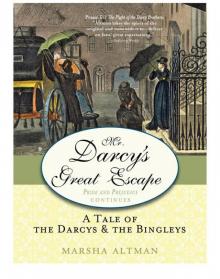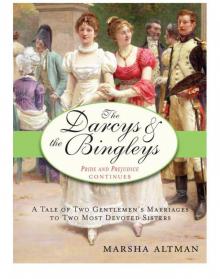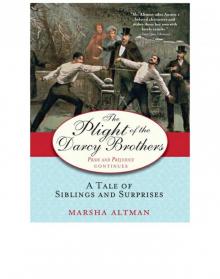- Home
- Marsha Altman
The Plight of the Darcy Brothers
The Plight of the Darcy Brothers Read online
Copyright © 2009 by Marsha Altman
Cover and internal design © 2009 by Sourcebooks, Inc.
Sourcebooks and the colophon are registered trademarks of Sourcebooks, Inc.
All rights reserved. No part of this book may be reproduced in any form or by any electronic or mechanical means including information storage and retrieval systems—except in the case of brief quotations embodied in critical articles or reviews—without permission in writing from its publisher, Sourcebooks, Inc.
The characters and events portrayed in this book are fictitious or are used fictitiously. Any similarity to real persons, living or dead, is purely coincidental and not intended by the author.
Published by Sourcebooks Landmark, an imprint of Sourcebooks, Inc.
P.O. Box 4410, Naperville, Illinois 60567–4410
(630) 961–3900
FAX: (630) 961–2168
www.sourcebooks.com
Library of Congress Cataloging-in-Publication Data
Altman, Marsha.
The plight of the Darcy brothers / Marsha Altman.
p. cm.
I. Austen, Jane, 1775-1817. Pride and prejudice. II. Title.
PS3601.L853P57 2009
813'.6--dc22
2009017531
Printed and bound in the United States of America
VP 10 9 8 7 6 5 4 3 2 1
Contents
Dedication
Chapter 1: The Master of His Realm
Chapter 2: Dark Clouds at Brighton
Chapter 3: The Sad Tale of Mary Bennet
Chapter 4: Storm at Chatton
Chapter 5: The D'Arcy's of Normandy
Chapter 6: The Account in Question
Chapter 7: The Invitation
Chapter 8: The Last Monks of Mont Claire
Chapter 9: The Royal Ball
Chapter 10: His Royal Highness
Chapter 11: Appointment with a Doctor
Chapter 12: The Longest Night
Chapter 13: Proper Discipline
Chapter 14: Going to Chapel
Chapter 15: Fire and Lies
Chapter 16: Stumbling Block
Chapter 17: Pilgrimage
Chapter 18: The Would-Be Priest
Chapter 19: Brian Maddox Rides Again
Chapter 20: The Last Journey
Chapter 21: The Long Way Home
Chapter 22: The Sad Tale of Mrs. Reynolds
Chapter 23: The Worst Kind of Call
Chapter 24: The Last Bennet
Chapter 25: The Darcy Brotherhood
Chapter 26: Requiem
Chapter 27: Sympathy for the Devil
Chapter 28: Epilogue
Historical Inaccuracies
Acknowledgments
About the Author
Dedication
To Mary Anne Dietrich, my sixth grade English teacher,
for believing in me.
And
To Kelly, Madison, and Hannah Scott,
for being really understanding when their mother disappears
behind the computer to edit for me.
THE MASTER OF HIS REALM
LOOKING OUT ON THE lands of Pemberley and surrounding Derbyshire as a king would his kingdom, and surveying all that was within his grasp, Fitzwilliam Darcy would normally breathe in a deep sigh of relief that all was under his control. He was the master of his own fate. He had been a loyal son, a diligent student, an excellent outdoorsman, a suitable gentleman, a good friend, a loving husband and brother, and now was a caring father as well. He handled every situation that had arisen, no matter how trying, usually with the utmost civility and control—not always, but usually.
Darcy supposed, with what little emotional distance he had left in him, he could look back on the matter and say that one who tempted God forced the Lord's hand to prove that Mr. Darcy of Pemberley and Derbyshire was not, in fact, the master of his own fate. He just wished it could have been done in a manner that was a bit more… subtle.
“Brother?”
He didn't turn to address Georgiana properly when he heard her voice. That would have required him standing, and he did not have the inclination to move. Manners would just have to suffer. Manners were gone from him entirely. “Yes?”
“Do you want something?” she stammered. “I mean, may I get you something? You've—you've just been out here a long time.”
Her, serving him? Didn't he have a well-paid staff for that? No, he remembered, he'd shooed them all away. “No, thank you. Is she awake?”
“No.”
Good. “I'm fine. Thank you for inquiring.”
She took that as a dismissal, which was good enough for him; he was not interested in having a conversation with his sister, or anyone for that matter besides Elizabeth, and then he had no idea of what to say. There hadn't been a course for this at Cambridge. What a waste of time; studying literature when it all amounted to nothing. He should have gone to medical school. He should have had a profession as a doctor and not been a uselessly idle gentleman who could do nothing of any worth in a crisis.
Georgiana had returned, because he felt her soft touch as she put a blanket over his shoulders. There was a chill in the evening air, but so far his mind had been elsewhere. “Just so you don't catch cold,” she said, and disappeared again. Maybe she didn't know what to say either. Not that the situation didn't merit excessive confusion or sorrow. That it had been unexpected, however, just proved fools of them all.
Elizabeth's courses had descended on her when they shouldn't have, four months into her term. He could only think “courses” because that seemed a less vulgar way to describe it than just bleeding, which was what it was. And pain. She had been a little stoic at first, but she did nothing to hide her alarm and rang for the most knowledgeable woman on these matters on the grounds, which was Mrs. Reynolds. Elizabeth was dismissive of his worries, perhaps fearing they would eclipse her own, and might have tried to ignore her condition entirely if it hadn't continued, and if pain hadn't set in. By the time the doctor arrived, their child was gone, though the doctor insisted on not calling it that, or having them call it that.
This was not the first time, but it was drastically more painful. Elizabeth's first term after giving birth to Geoffrey had also ended quite abruptly, and though that was startling, they had remained upbeat about her future prospects. The second term proceeded further along, so much so that Darcy would swear to her he could see a difference in her, even if she could detect none, and would whisper encouraging words to her at night.
That the Darcys' hopes for a second child had disappeared again for no apparent reason and in a chamber pot hit them both at a level they hadn't expected. Elizabeth was a normal woman and, in the course of their marriage, could expect to miscarry, perhaps as often as she carried to term. That her mother had never done so was a wonder unto itself, with all of the emphasis on the lack of sons in the Bennet family, Elizabeth admitted, between sobbing and being forced into bed from exhaustion.
This was not a formal mourning; no one had died, and there was every temptation to close ranks, at least for the moment. Nonetheless, from the very first look he had at the amount of blood she was losing (and where she was losing it from), Darcy had called for Dr. Maddox, who very unfortunately lived in Town and, therefore, could not appear in Derbyshire at a moment's notice. They had to settle for the local doctor, who was perfectly competent and on whom they had relied in the past, but Daniel Maddox still seemed a magical wonder who could save everyone and do no wrong. He had, in the space of three months, saved both Darcy's and his own brother's lives. But no, Dr. Maddox was in the south, and the message would not have reached him before all was over and done. If he did appl
y to Pemberley, it would only be to give his regrets as a relative for the unhappy circumstances.
Elizabeth had to tell Jane; of course, everyone would have to be told, because everyone had been told Elizabeth was with child some time before, but there was an order to imparting the news, and letters could not be formally set out like party invitations. It was more that Elizabeth demanded no one see her and then finally cried for her sister, leaving Darcy to fill in the order of the correspondences. In the shortest note and with his most precise and ordered handwriting, betraying nothing of what he felt, he wrote to Longbourn with the unhappy news and left it entirely to the Bennets' discretion as to who would come. Mary Bennet was still on the Continent, and Lydia was still the wife of George Wickham and, therefore, did not enter into his thinking.
He wrote to the Gardiners even more briefly, barely more than a line. The Hursts he would leave to Bingley, to whom he had applied by courier. The Bingleys had arrived within the hour. The only reason Darcy was willing to leave Elizabeth's side was because her sister had joined her. Whether they were talking or not was none of his business.
He was genuinely both happy Bingley was there and not in the mood to have a conversation with him, something he had made known mainly (he hoped) by inflection when he addressed Bingley, and then by disappearing onto the balcony outside his rarely used bedroom. He remembered through a haze that gentlemen did not show their tears, and that much stuck with him enough that he took the privacy afforded to him by Jane's arrival to disappear.
When he finally came inside, it was nearing midnight. His wife was sound asleep, so he only kissed her on the cheek, but he could not find the lack of energy required for his own retirement. Instead he went to the nursery, where his son was also asleep. Darcy began to conjure what he was to say to him in the morning, but nothing came, and Geoffrey Darcy slept on. All he could think of, and that he said out of earshot as to not wake his son, was, “You have no idea, the burden on your shoulders someday.” To be Master of Pemberley was to inflict a horrible circumstance on his wife, however unintentionally. Everything was colored by the circumstance; Darcy had in him still enough sense to see that.
Georgiana, again, found him first. “The Bingleys are staying the night.”
He just nodded numbly.
“Mr. Bingley is in the drawing room, but he said he doesn't require anything. Jane went to her room, and the dogs are still outside.” Because how they'd howled; it was unnerving when they knew something was wrong. “I'm sorry, Brother.”
“I am, too,” was all he could think to say as Georgiana embraced him.
“As much as I love my sister, I am so sorry someone as nice as Elizabeth has the fate of being Mrs. Darcy,” she said, and then added quickly, “Oh, I didn't mean—”
“It's fine.”
“No, I meant Mrs. Darcy. As in our mother.”
This lowered his guilt and self-pity and raised his curiosity enough for him to say, “What do you mean?”
“Well, I mean, you know—surely you know.”
“No,” he said. “I don't know.”
She put her hand over her mouth. “Then maybe I shouldn't have said. Certainly now isn't the time.”
“Actually, you haven't said anything,” he said, “as to what this is about. What do you know about our mother that I do not?” After all, Lady Anne Darcy had died shortly after giving birth to Georgiana. “Please. I insist.”
“I suppose you should know. It's just—ill-timed,” Georgiana whispered. “Our mother lost more babies than she bore, Brother.”
She gave him the time to properly sort it out. She was nearly thirteen years his junior, and he had no other siblings. So, with the years of marriage between his parents, who as far as he remembered cared for each other at least decently, either periods of barrenness or failed pregnancies made some sense. But the subject had never been openly discussed with him. “How did—”
“Mrs. Reynolds. Before I was to go out, she thought it prudent for me to know what to expect. Oh, please do not blame her.”
“Not in the least.” Mrs. Reynolds had been in the employ of his father since his own childhood and had been head of the household since his adolescence. It was no surprise that she knew more of the personal family history of the Darcys than he did—when it came to women's issues, at least. “Thank you for telling me.”
“I hope it was… some comfort.”
He smiled sadly at her, which was enough of an assurance that it was; she said her good-nights and disappeared. Most of his staff had retired, and he was inclined to wander for a bit. The halls had always given him comfort, even though now they just seemed empty and… barren.
The lights were still lit in the sitting room. Bingley was reading by the fire. Darcy took a seat by his side, and his friend nodded but said nothing. One of the things that Darcy valued very highly about their friendship was that, despite Bingley's reputation for being oblivious and talkative, he knew precisely when to be quiet—at least around Darcy. He was there, but he did not puncture the silence for a very long time, as his friend and brother stared numbly into the fire.
It was only after Darcy had began to play with it using the poker and made some noise that Bingley said softly, “It was never a competition.”
“I know,” Darcy replied.
And that was all that needed to be said.
The letter posted to the Maddox townhouse in exceedingly good time, but the doctor knew from the description that his arrival would be too late, and shrugged sadly. When his wife inquired as to the letter's contents, he told her the unhappy news. Even though he would never hold back from Caroline Maddox (neé Bingley) unless absolutely necessary, especially on family matters, Elizabeth was not her favorite person, and it could have been concluded at one time that she had wished Elizabeth ill. He doubted that was still true, but he still found himself surprised at Caroline's emotions, as she did seem saddened by the news.
They were in bed when the letter came, but he knew he would be getting up and racing to Pemberley. He ordered the carriage ready but stayed in bed nonetheless, at least for the moment.
“I suppose there's no reason to rush,” Caroline said.
“No,” he said. “I mean, I will go, but not this instant. By now, she may well be fully recovered physically, though not fully emotionally.” He sighed. “Mr. Darcy wants me to work a miracle, I suppose. Or he did when he was writing this letter. Mr. Darcy does not seem likely to remain insensible for an entire day. I doubt I could have done anything, even if I was standing there. I am not an expert on womanly issues, but I know that much.”
“Perhaps you should become an expert.”
He smiled, but then he looked at her in the lamplight and realized she hadn't meant her comment to be a joke. He took her hand and found it trembling. While he was processing what he was going to say to Darcy, he hadn't even considered… He kissed her palm, as if that would placate her fears. “Everything will be all right.”
“And if it's not?”
“These things are not of our control,” he said. “Perhaps something is wrong, and the body just… rejects it. Instinctually.” He cracked a weak smile. “I tend to be one for trusting a woman's instincts.” His hand strayed to her stomach, feeling under the bed robe.
“It's what makes you a good doctor,” she said, kissing him on the cheek. “That and your skill with a needle. If we have a daughter, you can teach her how to embroider cushions and tablecloths, and turn her into a proper little lady.”
“I do believe I've just been insulted,” he said. “And I think I am going to ignore it.” He eventually heaved himself up off the bed and began to stumble around for his clothing.
“I want to come. I mean, to Chatton, where I imagine you'll be staying. Unless you think—”
“Not at all. You could ride to France if you wanted.”
“Darling, you can't ride to France.”
“I meant it metaphorically,” he said. He leaned over and kissed her again. “You wi
ll be fine if you come along.”
She needed reassuring.
On the pretense of visiting Jane, the three available Bennets made their way to Derbyshire. Since officially nothing had happened, or nothing to be spoken of except in privacy, the only family gathering was at Chatton, the Bingleys' home, and those who were wont to visit Elizabeth could easily do so.
Mrs. Bennet was the first to appear, fortunately with Jane. Darcy took Mrs. Bingley aside and said quite quietly and clearly, “If she says something that upsets Elizabeth, I will cast her out of Pemberley. Not to be rude to my mother-in-law, but you understand?”
“Perfectly,” said Jane, and followed her mother.
Elizabeth Darcy was still in bed. She had not left her chambers in several days and was rarely upright. The shades were drawn even though it was past noon, putting the room further into stupor right along with her.
“This… this won't do,” said Mrs. Bennet nervously, as if she didn't know how to act around her own daughter, and she pulled open the curtains, filling the room with light. “Two hundred servants, and you can't have someone opening your own curtains?”
To this, her shocked daughter had no response. Mrs. Bennet ran around the bed again and sat beside her daughter, embracing her, and with this, she was silent. Jane sat down on the chaise, somewhat bemused.
“Now, now, Lizzy, we're all very sorry, and I am sorry to be the first one to tell you this, but as mothers we are to suffer some unhappiness in our lives.”
“Mama,” Elizabeth said incredulously, “I do know that.”
“No, nothing compares, then, to the trials of motherhood. No matter how happy or well settled or loved we are, we will all suffer a bit in our turn. I spent far too many years wracking myself with guilt to watch you do it. Do you wish your wonderful Mr. Darcy to have suddenly married someone like me?”
“Mama,” Jane said in Elizabeth's place, “what do you mean?”
“You know precisely what I mean. You're both women with children. But you had the great ability to bear sons, and I did not. So you have already succeeded where I failed, and that itself is cause for joy, no?” She stroked her second daughter's hair. “It may not feel this way now—we women have a tendency to lose perspective, even you, Lizzy, but you have all the treasures of the world in front of you—a loving husband, a wonderful home, and a beautiful son.”

 The Knights of Derbyshire
The Knights of Derbyshire Other Tales: Stories from The Ballad of Gregoire Darcy
Other Tales: Stories from The Ballad of Gregoire Darcy The Ballad of Gregoire Darcy
The Ballad of Gregoire Darcy Mr. Darcy's Great Escape
Mr. Darcy's Great Escape The Darcys and the Bingleys
The Darcys and the Bingleys The Plight of the Darcy Brothers
The Plight of the Darcy Brothers The Road to Pemberley
The Road to Pemberley